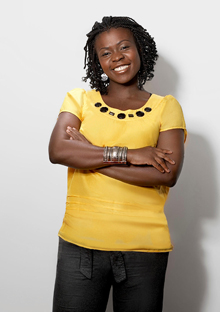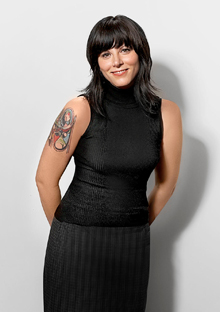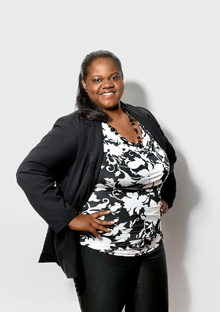
In 2008 we met 80 women hoping to get some big ideas off the ground. One year later, three of those ideas have taken flight. World, prepare to be changed.
At O, we may be all about the aha moment, but until last year's Women Rule! conference in New York City, we'd never seen so many of them happening at once. The 80 women having the insights were those who'd won our Women Rule! contest—cocreated with the White House Project, a nonprofit organization that gives women the training they need to advance in business, politics, and media. Chosen from more than 3,000 entrants, all were self-starters with one thing in common: the idea for an innovative project that hadn't yet taken shape. The women immersed themselves in three days of workshops, lectures, and coaching on everything from fund-raising to public speaking, and at the end, the scrimmage for business cards and e-mail addresses turned into a full-contact sport. Marie Wilson, the White House Project's president (and cofounder of Take Our Daughters to Work Day), understands the power of female networking. "At the conference," she says, "we gave the women the tools to push their ideas forward—and that's important—but the energy and encouragement they got from each other was the kicker for me. And it is every time." A year later, three participants tell us how that energy put them over the top:

Raolat Abdulai
27, Clarksville, Maryland
Her project: A free holistic medical clinic

Micki Krimmel
31, Los Angeles
Her project: A green, online swap meet

Lea Webb
29, Binghamton, New York
Her project: A grocery store in an underserved neighborhood

Photo: Ben Goldstein/Studio D
Raolat Abdulai's Women Rule! Takeaway
Always be ready to rethink the plan.When it comes to healthcare, something revolutionary is happening in Washington, D.C.—and not on Capitol Hill. Just beyond the double doors of Howard University Hospital, in the city's LeDroit Park neighborhood, a brand-new clinic is providing free health and social services to uninsured patients, all thanks to a fourth-year medical student named Raolat Abdulai.
"I'm going to come there and make a difference," Abdulai had written in her application to Howard University College of Medicine, where she was accepted in 2006. Born in Nigeria (her family moved to Maryland when she was 5), she devised a plan to open the student-run clinic during her second year of med school. She wanted it to provide comprehensive services to patients lacking insurance—including assistance with mental health issues, housing, food, and transportation—and also give future doctors practice in delivering holistic, compassionate care. Her professors were enthusiastic, and Abdulai quickly assembled a planning committee of fellow medical students from Howard, Georgetown, and George Washington universities; together, she imagined, they would organize the jointly run clinic.
But even scheduling a meeting with the time-pressed students from all three schools proved nearly impossible. Between the logistical challenges and a lack of funding, Abdulai's project had all but flatlined when she won a place at Women Rule!, where she says she learned two valuable skills: the ability to write a business plan and the art of adaptation. "One of the speakers told us, 'If you have a plan that isn't working, shift your approach. Even if it's not how you originally envisioned getting there, it's going to help you reach the finish line.'"
After the conference, Abdulai decided to pare down her volunteer pool. Instead of reaching out to three schools for students, she narrowed her focus to Howard. She contacted the school's alumni for donations, and in addition received $30,000 from the Association of American Medical Colleges Caring for Community Grant program. Once the money was in place, she enlisted the help of a few Howard MBA students to wrangle the financials. Finally, after finding a site in the hospital's outpatient center, an attending physician to supervise all patient care, and two dozen willing volunteers, Abdulai opened her clinic in June.
It was a meteoric accomplishment, especially on top of going to medical school. But bafflingly, after all that hard work—the planning, the passion, the effort—the patients didn't come. "I was so disappointed," Abdulai says. "We thought everything was fine, and then it just...it just didn't work." That's when she remembered the "stay flexible" message. And she realized that the clinic's location, in the depths of the hospital, was too out-of-the-way for the patients it was meant to serve—primarily walk-ins. So she moved it just off the hospital's main 5th Street entrance.
Today patients fill the spacious waiting area. When one arrives, medical students take her history before her case is presented to the attending physician. Each patient is also assessed for social needs and connected with health insurance, housing, and food services. A medical student follows up after she leaves.
Patient feedback has been so positive that Abdulai is already considering ways to expand. Howard medical students are lining up to participate. "If it wasn't for the conference," says Abdulai, who has decided to pursue internal medicine, "I'd probably still be running in place."

Photo: Ben Goldstein/Studio D
Micki Krimmel's Women Rule! Takeaway
When lacking resources, look within yourself.Picture a suburb full of lawn mowers, one per garage. Each machine is sturdy, dependable, a sizable investment, and—given the energy required to manufacture, store, package, and ship it—quite the carbon culprit, especially since most lawn mowers see action only once every week or two. Now picture the same neighborhood with just a single lawn mower, along with a schedule of everyone's turn to use it. This was the idea that got Micki Krimmel, an energetic Internet consultant, fired up to start a new Web site: Neighborgoods.net.
By no means limited to lawn mowers (though there is currently one available to borrow in Austin if you're interested), the just-launched NeighborGoods has everything from computer printers to concertinas, which members in the same locale can borrow, rent, sell, or give away to one another. (For example, while you might lend your ladder to anyone in your network, you'd probably offer your favorite boots only to friends, and you'd likely charge money for the use of your car.) The site keeps track of each exchange and alerts users when a requested item becomes available.
Founder of the popular Mickipedia blog and video series—a rollicking catalog of her thoughts on life, politics, and her Roller Derby team—Krimmel conceived her idea after working for the company behind Al Gore's Oscar-winning 2006 documentary An Inconvenient Truth. Charged with creating a social-networking campaign for the film, she came to understand the transformative power of viral word of mouth. "We were always talking about building communities, and having a smaller footprint. Instead of getting rid of stuff, I thought, 'Why not share it?'" Yet despite her extensive consulting experience, when it came to starting a site from scratch, she says, "I felt like I was jumping headfirst into an unknown world." Krimmel's first hurdle involved securing financial underwriting. "I was spending so much time thinking about partners and investment, it was overwhelming," she says. But then she attended Women Rule!, where she met scores of other women dealing with similar roadblocks: "I remember thinking, 'Instead of focusing on what I don't have, I can focus on what I do have.'" Shortly after she returned home, one of her consulting clients decided to invest in NeighborGoods and gave her what she needed to get the project off the ground. The site launched its trial run in July.
Eventually, members will be charged a small fee to help cover NeighborGoods' administrative costs, but for now the site is free. "The environmental and financial benefits of sharing are obvious," says Krimmel. "Really what I hope this does is bring people together. Ideally, by sharing things like power tools and camping gear, we can regain the sense of local community we seem to have lost."

Photo: Ben Goldstein/Studio D
Lea Webb's Women Rule! Takeaway
If you're out of options, rally the troops.It may be only one block long, but Pearne Street—located in Binghamton's North Side—offers a crash course in the socioeconomic challenges facing the area. The crumbling Victorian homes, apartment buildings in disrepair, and trash-strewn lots give way to Binghamton Plaza, where one of the neighborhood's two grocery stores used to stand. Now the plaza is almost empty except for a Kmart, and there's nowhere to buy fresh food for more than a mile in each direction. A dispiriting sight, to say the least—unless you're accompanied by City Councilwoman Lea Webb. The first African-American to hold office in Broome County, Webb knows how to look past the problems to see the potential. She points out municipal notices posted on the derelict houses: Thanks to her efforts, the city will be addressing these eyesores. That vacant lot? It's slated to become a community garden. And the abandoned McDonald's in the plaza? This is her biggest coup yet. The structure—empty for a decade and surrounded by cracked asphalt—will soon be torn down to make way for the neighborhood's first grocery store in 15 years.
A lifelong resident of the city, Webb understands firsthand the frustrations of having to take a taxi or public transportation to buy fresh food. But it was in 2006 at a community meeting that a warm, intense woman named Mrs. Marshall—affectionately known in the neighborhood as Grandma—stood up and said something that galvanized her: "She told me she didn't want to see any more old women struggling to get off the bus with their groceries," Webb says. That was the moment Webb put the cause at the top of her to-do list.
At first she made only stuttering progress as she waded through miles of bureaucratic red tape, while organizing a weekly farmers' market as a stopgap solution. But as the months wore on, Webb grew discouraged. How would she obtain a site, funding, approval from the city—or even advice? Despite her loyal supporters and iron will, the project stalled.
Then she won a spot at Women Rule! and met Libby Cook, president of Philanthropiece (a foundation that supports local service projects) and cofounder of Wild Oats Markets, the second largest natural foods chain in North America. Cook, who counseled some of the participants at the conference, offered Webb guidance for months afterward. Webb also took home a valuable lesson from Marie Wilson: "She said, 'Bring people into your project who have something to gain from its success,'" Webb recalls. "It was so simple—and so smart."
Once home, she picked up the phone. It wasn't hard to find people who would benefit from the grocery project. "It meant jobs at the store, and jobs for those constructing it. It meant healthier residents. It meant other stores being willing to develop nearby. It meant money staying right here in this neighborhood," says Webb. She called Binghamton University professors, Broome County officials, community groups, local charities, the mayor, and a state assemblyperson. Her outreach efforts eventually caught the attention of New York state senator Malcolm Smith. "Government, community, church, the private sector—Lea's got them all behind her," he says. "That's not easy to do. There's always one missing." Impressed by her crusade, Smith pledged $150,000 of state money toward the old McDonald's demolition and the clearing of the site.
Finally, by 2008, the whole thing came together. With input from one of Cook's contacts, Webb chose a vendor—the Save-a-Lot grocery chain, which agreed to meet all of Webb's criteria (they must hire locally, pay at least a few dollars above minimum wage, provide employee benefits, and address the area's ethnically diverse food needs). With environmental inspections under way, the store is expected to open in spring 2010. "At the groundbreaking," Webb says, "I'm going to have tears in my eyes."
More from the Women Rule! Conference







